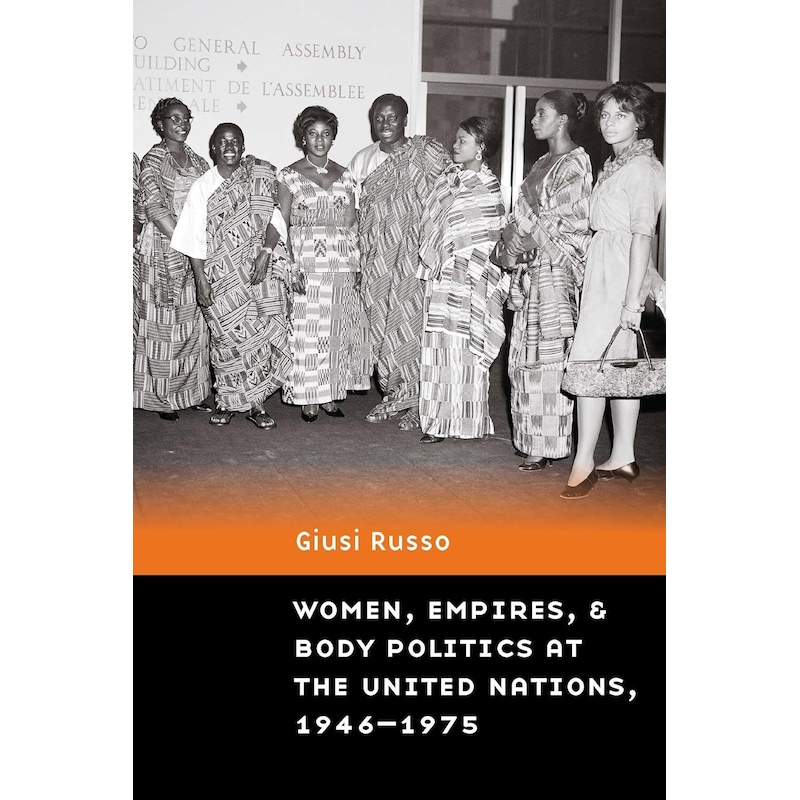


Women, Empires, and Body Politics at the United Nations, 1946-1975 tells the story of how womens bodies were at the center of the international politics of womens rights in the postwar period. Giusi Russo focuses on the United Nation Commission on the Status of Women and its multiple interactions with the colonial and postcolonial worlds, showing how--depending on the setting and the inquiry--liberal, imperial, and transnational feminisms could coexist. Russo suggests that in the early stages of identifying discriminating agents in womens lives, UN commissioners overlooked the nation-state and went through a process of fighting discrimination without identifying the discriminator. However, it was the focus on empire that allowed for a clear identification of how gender constructs were instrumental to state politics and the exclusion of women. An emphasis on colonial practices also generated a focus on the body and radically shifted the commissions politics from formal equality to a gender-based equilibrium of rights that emphasized practice rather than law. Through a multidisciplinary approach, Russo looks at the women living under colonial and postcolonial systems as the key actors in defining the politics of womens rights at the UN.Giusi Russo is an assistant professor of history at Montgomery County Community College in Pennsylvania.
P>Review "Women, Empires, and Body Politics at the United Nations, 1946-1975 constitutes a very significant contribution to the study of the UNs gender politics, imperial feminism, and Cold War history, which will equally interest historians of womens and gender history and historians working on the global Cold War."--Chiara Bonfiglioli, H-Diplo"In recent years, a new wave of histories has documented the broad range and reach of womens interventions in the international arena in the twentieth century. Giusi Russos Women, Empires, and Body Politics provides a welcome addition to this literature, exploring how women from a wide variety of countries engaged with the formal mechanisms created by the United Nations (UN) in the years before International Womens Year (1975). Russo focuses, in particular, on the records of the Commission on the Status of Women (CSW), an archive that had largely been untapped to date."--Nicole C. Bourbonnais, Womens History Review-- (5/3/2023 12:00:00 AM)"Giusi Russo sheds light on the pivotal and until-now-overlooked role the UN Commission on the Status of Women played in defining international womens rights between 1946 and 1975. During this era of the Cold War, decolonization, and economic development, the CSW developed the blueprint for what was later popularized as womens rights are human rights. . . . Demonstrating the inextricable links between body politics and international politics, Russos book fills important gaps in global feminist, foreign relations, and human rights histories."--Katherine M. Marino, author of Feminism for the Americas: The Making of an International Human Rights Movement"An astute analysis. Giusi Russo provides a chronology of the emergence of body politics and the move from public (civic and political equality) to private (marriage and reproduction) discrimination that characterized this lingering period of imperial feminism. Russo has produced a theoretically sophisticated work that moves the discussion of feminisms in new directions by centering the Global South during and after colonial occupation."--Eileen Boris, author of Making the Woman Worker: Precarious Labor and the Fight for Global Standards, 1919-2019 About the Author: Giusi Russo is an assistant professor of history at Montgomery County Community College in Pennsylvania.
We ship Australia-wide, including all major cities such as Sydney, Melbourne, Brisbane, Perth, Adelaide, Canberra, Newcastle, and the Gold Coast.
Same-Day Dispatch:
Orders placed before 12pm (AEST) are guaranteed to ship the same business day. Orders placed up until 1pm often still ship same day, but this is not guaranteed.
Estimated Delivery Timeframe:
• Metro areas in major cities like Melbourne, Sydney, Brisbane, and Canberra typically receive their orders within 1–2 business days.
• Regional and rural areas, or deliveries to states such as WA, SA, NT, and TAS, may take up to 10 business days, depending on location and courier performance.
Delivery times may vary slightly during peak periods, but we always aim to get your order to you as quickly as possible.
We offer a 30-day satisfaction guarantee on all purchases.
Returns:
Returns are accepted within 30 days of receiving your item. Items must be returned in their original packaging and in the same condition as when they were received. Change-of-mind returns are accepted only for items that are new and sealed. Items that are used or no longer in their original condition may not be eligible for a full refund.
Defective Items:
If your item arrives damaged or faulty, please contact us as soon as possible, and we’ll arrange a return or replacement where applicable.
Warranty:
We do not provide warranty coverage beyond the initial 30-day period. For any issues arising after this time, warranty claims must be made directly with the manufacturer in accordance with their terms.
Estimated Delivery Time Frame: 5 - 10 business days